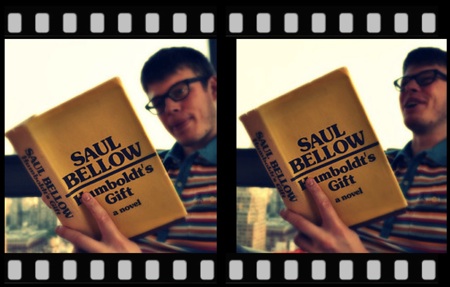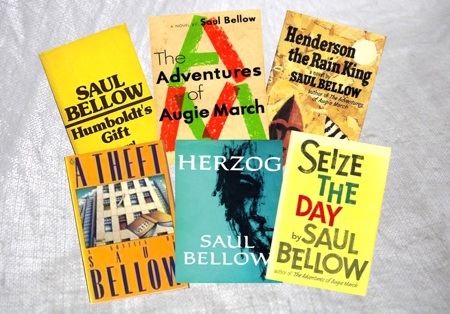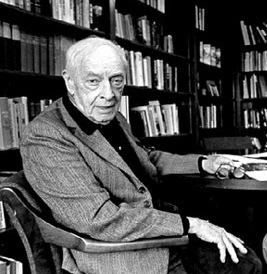Part One: a season’s reading
I began the year without having read a page of Saul Bellow, and made a plan to fix this. As a writer concerned with the life and sensuality of his own prose, I wanted to provoke an encounter with the American novelist who James Wood claims, “…makes even the fleet-footed—the Updikes, the DeLillos, the Roths—seem like monopodes.” If Wood’s claim was true, I wanted to first enjoy this fleet-footedness, and secondly figure out how it was done. Planning my survey, I was not necessarily interested in achieving completeness. I would read, I decided, five Bellow novels, absorbing and savouring something of Bellow’s sentence and novel-making, and go further if the feeling moved me. Bellow, of course, had written more than five books, and far more than five books had been written about him, but I invoked the artist’s sweet prerogative of leaping to conclusions, of being biased, partial, fanatical. We are not as moral as scholars, who feel unjustified if they judge from a position of half-knowledge, a desire for credibility that perhaps obscures for them a little of each book’s divine fire. I tried, therefore, during my reading project—which ended up including the six novels The Adventures of Augie March, Henderson the Rain King, A Theft, Herzog, Seize the Day, and Humboldt’s Gift, plus his Collected Letters and his collection of essays, It All Adds Up—to read more as writer than critic, to eat well, although I am not sure I succeeded in avoiding the mind set of the English teacher, and in the judgements that follow, you may well feel that I have failed. Although I have now read a major portion of his work, Saul Bellow’s fiction continues to perplex me.
However, before I begin my introduction to Saul Bellow’s beauties and confusions, I’d like to answer any readers’ doubts about the value of making such a single-author study. There are disadvantages: for instance, flaws that recur novel to novel become disproportionately noticeable. Probably Bellow’s contemporaries noticed that the female characters in Humboldt’s Gift seem awfully like the female characters from Herzog, but as eleven years had passed between their reading of the two works, it may not have bothered them the way it bothered me. And it is hard not to assign a narrative to the development of the writer’s art, seeking in the current novel what one felt incomplete in the just read. But I think the more serious doubt a writer or lover of literature might have, in our hurried age, is that to focus on one author like this seems indulgent, a fatal luxury when so much unread literature cries its demands. How can I devote a season to Bellow while still ignorant of Cervantes? Against this worry I must stand firm. Reading is not worth doing if it becomes a craven struggle to feel well informed. Remaining human in our continuing search for pleasure and education in literature, we should accept that we are people, not filing cabinets, and the two best ways I have found to do this involve either focusing on a writer’s work or a critic’s recommendations. Better to cultivate and care for one garden than, like a squirrel, dig frantic holes in a great number.
Part Two: Bellow’s staggering paragraphs.
The first Bellow novel I opened was The Adventures of Augie March (1953), a six-hundred-page word-avalanche. I’m not sure anything can prepare you for the density, the vitality, the variety of Augie March’s delivery. What takes this beyond the merely impressive—any writer can open a thesaurus—is how Augie sounds like he is inventing his language as he goes along. He is a self-educated street urchin who just happens, somehow, to be able to throw out with unconscious ease one unique phrasing after another.
The filth of the house, meantime, and particularly of the kitchen, was stupendous. Nevertheless, swollen and fire-eyed, slow on her feet, shouting incomprehensibly on the telephone, and her face as if lit by that gorgeous hair which finally advanced her into royalty, she somehow kept up with her duties. She had meals on time for the men, she saw to it that Friedl practiced and rehearsed, that the money collected was checked, counted, sorted, and the coins rolled when Coblin wasn’t on hand to do it himself, that the new orders were attended to.
Part of this “vernacular” effect comes from how the final parts of the long sentences do not live up to the grandeur of what precedes them. After we read about fire-eyes and royally gorgeous hair, Augie finishes with, “She somehow kept up with her duties,” an abrupt drop in register, as if he has heard what a periodic sentence is but didn’t quite grasp the principle, or seems dubious of his own eloquence.
One has the feeling of simply getting more in one of Augie’s paragraphs than one gets from some whole chapters of other narrators, as if he could present a dozen more adventures without fatigue.
At first we often worked in the same places. We went to Coblin’s sometimes when he needed us for his crew, and down in Woolworth’s cellar we unpacked crockery from barrels so enormous that you could walk into them; we scooped out stale straw and threw it in the furnace. Or we loaded paper into the giant press and baled it. It was foul down there from the spoiled food and mustard cans, old candy, and the straw and paper. For lunch we went upstairs. Simon refused to take sandwiches from home; he said we needed a hot meal when we were working. For twenty-five cents we got two hotdogs, a mug of root beer, and pie, the dogs in cotton-quality rolls, dripping with the same mustard that made the air bad below. But it was the figure you cut as an employee, on an employee’s footing with the girls, in work clothes, and being of that tin-tough, creaking, jazzy bazaar of hardware, glassware, chocolate, chicken-feed, jewelry, drygoods, oilcloth, and song hits—that was the big thing; and even being the Atlases of it, under the floor, hearing how the floor bore up under the ambling weight of hundreds, with the fanning, breathing movie organ next door and the rumble descending from the trolleys on Chicago Avenue—the bloody-rinded Saturday gloom of wind-borne ash, and blackened forms of five-storey buildings rising up to a blind Northern dimness from the Christmas blaze of shops.
Reading critics on Bellow, one sometimes gets the feeling that they believe such language is to a large extent a memesis of actual Chicago Jewish street-talk, that Bellow wrote like this because it was how he spoke or thought. But when one reads lines like, “… hearing how the floor bore up under the ambling weight of hundreds,” one realises that such a view is simple craziness. Vowel hunters will have already noticed how the phrase starts on one loose pattern—how, floor, bore—and then switches to another—under, ambling, hundreds. Perhaps something similar occurs in the equal marvel that is, “the bloody-rinded Saturday gloom of wind-borne ash.”
But Augie was not the end of Saul Bellow’s development as a stylist. The novel came out when he was thirty-eight, and he continued to write during his long life, publishing his last novel, Ravelstein, almost fifty years later. I detected two additional style periods in my incomplete survey. Firstly, in Seize the Day (1956) and Herzog (1964), Bellow seemed to create a “mature” style, restraining the abundance of Augie in order to create pure beauty. Herzog, in particular, reads so beautifully at times it doesn’t feel like reading, more like looking out a window on a breezy day, or overhearing music.
This is from the novel’s first page:
It was the peak of summer in the Berkshires. Herzog was alone in the big old house. Normally particular about food, he now ate Silvercup bread from the paper package, beans from the can, and American cheese. Now and then he picked raspberries in the overgrown garden, lifting up the thorny canes with absent-minded caution. As for sleep, he
slept on a mattress without sheets—it was his abandoned marriage bed—or in the hammock, covered by his coat. Tall bearded grass and locust and maple seedlings surrounded him in the yard. When he opened his eyes in the night, the stars were near like spiritual bodies. Fires, of course; gases—minerals, heat, atoms, but eloquent at five in the morning to a man lying in a hammock, wrapped in his overcoat.
Why is this so great? The tone is quiet, deliberate, a narrator explaining just how things are, someone who will introduce us to the metaphysics in Herzog’s mind but will not be pushy about it. A voice both authoritative and agnostic. And the sentences vary so well in length and rhythm, creating that effortless reading experience I just waxed about. The paragraph opens with two short and simple “be” sentences (“It was,” “Herzog was”), then the third puts the main clause in the middle, and ends with a list whose items come in increasing brevity. Between two sentences that begin with dependent clauses (“As for sleep,” “When he opened his eyes”), Bellow gives us a one clause sentence with an long subject phrase (“Tall bearded grass and locust and maple seedlings surrounded him…”). This variety makes for easy eyes. And, intellectually, we feel like we have touched many things journeying through this one short block of text—the warmth of day and cold of night, processed food versus the thorns of berries, a failed marriage surrounded by pleasant nature, the stars, spirituality versus science, solitude. We feel that real life is actually like this, this constant interplay of complexities, and we were longing for a novelist who knew how to do justice to the scope of our own shimmering thoughts.
Then, in Humboldt’s Gift, published when Bellow was sixty, Bellow seems to deconstruct his own stylistic achievement, creating for his frantic narrator Charlie Citrine a more repetitive, less various prose.
Cantabile caught me by the sleeve. “You wait,” he said. I didn’t really know what to do. After all, he carried a gun. I had for a long time thought about having a gun, too, Chicago being what it is. But they’d never give me a license. Cantabile, without a license, packed a pistol. There was one index of the difference between us. Only God knew what consequences such differences might bring. “Aren’t you enjoying our afternoon?” said Cantabile, and grinned.
Humboldt’s Gift means to race along, in a five hundred page dash of subject-verb-object sentences, as Citrine’s so-called friends pull him onwards through journeys of crime, divorce, sex, socialising, at the same as he attempts, in the quiet of his own mind, to remember his friend and hero, the dead poet Humboldt, and to come up with a genuine solution to the decline of poetry in our modern age. Humboldt’s Gift is frenetic, sexy, unbelievably erudite, and for about 380 pages of its 500 was one of the greatest reading experiences of my life. I have not often felt so compelled to keep reading a literary work, grabbing time to stretch out on my sofa and catch another thirty pages, feeling satisfied on so many mental levels, from carnal to abstract. And yet, the novel’s last hundred or so pages were a colossal letdown. I have rarely been so dismayed by a book’s so-called climax, and wished that Saul Bellow were still alive so I could ring him to ask, “What the fuck?” The novel seems to fall away from its ambitions, losing faith in itself. By the last few scenes, Bellow seems to be pretending that he hadn’t wanted to say or dramatise anything in the first place. A reader may at first feel cheated, and then start to wonder if she has missed something.
Indeed, during my reading of his six novels, this discordant mix of emotions was a regular companion. For me, Bellow’s work continually captured my admiration, but only rarely my loyalty, and for all his obvious genius, few of his novels landed quite right. Now, I may have been too picky, my critical impulses sharpened by the speed at which I moved from one Bellow book to another. I may be one of the intellectuals that Bellow is constantly critiquing in his letters and essays. But reading his critics, it’s clear that there is a sort of “Bellow problem,” whose parameters have a remarkable degree of uniformity among critical readers, and which even his admirers feel the need to justify. It is this problem that I will now address, and try to find a solution for.
Editor’s Note: Here is Part II of Wallace’s essay on Bellow. In it, Wallace considers how Bellow constructs philosophical briar patches into which character and reader may fall, the progression of characters throughout the six novels, and how reading Bellow’s nonfiction provides the perfect foil to his fictional expansiveness.
Further Links & Resources are included at the end of Part 2.








